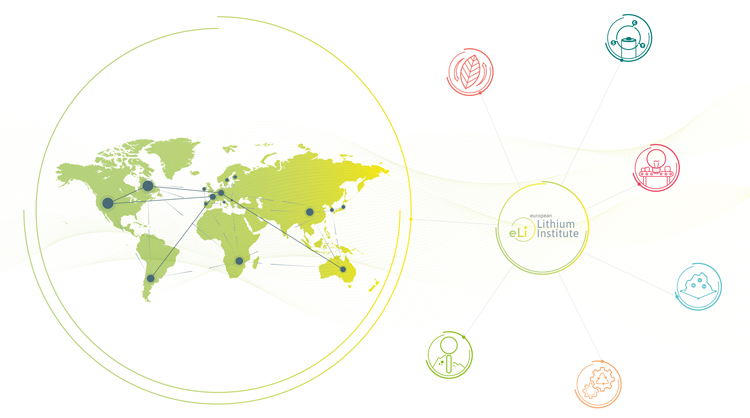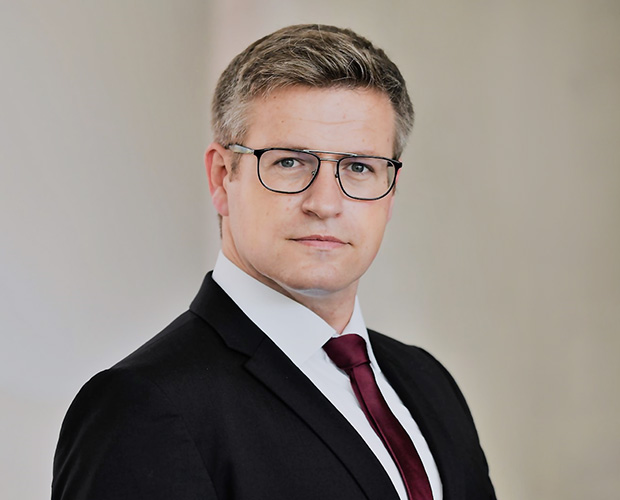New Approach to Sustainable Lithium
The demand for lithium is rapidly growing, but Europe’s conventional resources are limited. Connecting European circular economy to global networks, the EIT RawMaterials Innovation Community and leading European research institutions initiated the European Lithium Institute eLi. The virtual institute will gather relevant stakeholders along the whole lithium battery value chain to generate focused international cooperation. eLi started its operational work and welcomes industrial actors as partners and members as well.
European energy transition and electric mobility transition leads to a rapidly increasing demand for lithium for energy storage devices. Global demand for lithium is forecast to increase more than six-fold by 2030 (source: BloombergNEF), largely driven by demand from lithium-ion battery technologies with an estimated annual growing rate of 25 % (source: World Economic Forum). Compared to the current status, the European Union could even need up to 18 times more lithium in 2030 and almost 60 times more lithium in 2050 (source: European Commission). In addition to the battery industry there is also a significant demand in other sectors such as glass and glass ceramics as well as lightweight alloys.
Without targeted measures and decisive action, this may lead to supply issues in the future. The European Commission recently declared lithium to be a critical raw material for the EU. To reduce Europe’s dependency on foreign lithium and related critical energy materials, novel approaches are necessary. The aim is to solve currently existing issues concerning lithium, as well as the problems that can arise in the future.
Ramp-up the European Lithium Institute eLi
eLi was founded as an international non-profit organization. Founding members are Fraunhofer-Gesellschaft e. V., Germany, with the coordinating Fraunhofer-Institute for Silicate Research ISC, CEA – Commissariat à l’énergie atomique et aux énergies alternatives, France, BRGM – Bureau de Recherches Géologiques et Minières, France, Université de Bordeaux, Université de Lorraine, HZDR – Helmholtz-Zentrum Dresden-Rossendorf and KU Leuven. Other partners – in particular from industry – will be integrated step by step. To maintain the leading position of Europe’s high-tech industry and to improve its environmental footprint, all stakeholders are required. “Such major undertakings for a sustainable accessing and circular economy of lithium can only be realized with a strong European consortium, including stakeholders from all parts of the value chain”, explains Dr. Andreas Bittner, CEO of the European Lithium Institute, the motivation leading to eLi.
The long-term vision is the establishment of a sustainably funded European Lithium Institute with strong industry contribution and high impact on a sustainable supply of lithium and related critical raw materials for Europe.
European potentials and international partnership
According to S&P Global Market Intelligence, the current main lithium resources and reserves are located in Argentina, Bolivia, USA, Chile, Australia and Canada, among others. European lithium resources are mainly unconventional (jadarite, zinnwaldite, lepidolite, geothermal Li brines) gradually being characterized, but are not yet under operation. An additional aspect is that there is presently no lithium-refining industry in Europe, ores mined in Europe have to be sent for instance to the Chinese refining industry. Therefore a sustainable supply for the European industry is not secured. Consequently a global network with specific focus on South America, Canada and Australia has to be established and novel approaches to unlock the potentials of European lithium resources have to be implemented.
Focus areas and main activities
The focus areas for the European lithium strategy are substitution of critical and toxic materials in products, exploration and raw materials resources assessment, mining in challenging environments, increased resource efficiency in mineral and metallurgical processes, recycling and material chain optimization for end-of-life products, design of products and services for the circular economy. By pooling expertise in these fields plus additional expertise in predictive modelling, eLi will generate focused international cooperation and offer comprehensive advice to use lithium in a sustainable, responsible and economically sensible way regarding the following goals:
- Bottlenecks in the lithium and in particular lithium-ion battery value chain shall be identified and tackled.
- Strong global networks to respective mining countries shall be established.
- New European resources shall be examined.
- A semantic database sourcing all strategic relevant information concerning lithium resources, life cycle analyses as well as processing and application technologies shall be built up.
- Relevant knowledge for the European battery industry shall be generated and secured by targeted R&D, R&I and education activities.
Connecting lithium worldwide

eLi establishes a global network for the lithium value chain – exploration and mining, processing and recycling, materials and components, design and manufacturing, circular economy and predictive modelling, business models and applications.
Supported by


Dr. Andreas Bittner
Executive Director
European Lithium Institute eLi
Rue Royale 94
1000 Brussels
Belgium
Phone +49 931 4100-213
